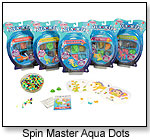 |

Tools:








Spin Master to Pay $1.3 Million Fine for Aqua Dots Violation
|
Federal law requires manufacturers, distributors, and retailers to report to CPSC immediately (within 24 hours) after obtaining information reasonably supporting the conclusion that a product contains a defect which could create a substantial product hazard, creates an unreasonable risk of serious injury or death, or fails to comply with any consumer product safety rule or any other rule, regulation, standard, or ban enforced by CPSC.
|
WASHINGTON, D.C. - The U.S. Consumer Product Safety Commission (CPSC) announced today that Spin Master, Inc. of Los Angeles, California, and Spin Master Ltd. of Toronto, Canada, ("Spin Master") have agreed to pay a civil penalty of $1,300,000. The penalty agreement (pdf) has been accepted provisionally by the Commission (5-0).
The settlement resolves staff allegations that Spin Master knowingly failed to report the defect and hazard associated with Aqua Dots to CPSC immediately, as required by federal law. The settlement also resolves CPSC staff allegations that Spin Master knowingly imported and sold Aqua Dots, which were toxic and a banned hazardous substance, in violation of federal law.
 Aqua Dots was a children's craft kit and toy that consisted of tiny beads of different colors that stuck together when sprayed with water, allowing children to create various shapes and designs. Aqua Dots was a children's craft kit and toy that consisted of tiny beads of different colors that stuck together when sprayed with water, allowing children to create various shapes and designs.
CPSC staff alleges that by the middle of October 2007, Spin Master had received reports that children, and a dog, had become ill and received emergency medical treatment after ingesting Aqua Dots. On October 18, 2007, Spin Master learned that Aqua Dots contained 1,4-butylene glycol (TMG), which, upon ingestion, metabolizes to the controlled substance gamma hydroxybutyrate (GHB). The following day, Spin Master learned that TMG is harmful if swallowed, and upon ingestion, targets the kidneys and central nervous system.
CPSC staff also alleges that in the ensuing days and weeks, Spin Master continued to receive reports of children falling ill after ingesting Aqua Dots. Spin Master also learned that children who ingested a similar product containing TMG, which was manufactured by the same overseas factory, also had become ill. Spin Master did not timely report any of the incidents to CPSC.
In early November 2007, CPSC received two reports of children who had ingested the product, become ill, fallen into comas, and required hospitalization. On November 5, 2007, CPSC staff notified Spin Master of an ingestion illness incident that it had received. Two days later, Spin Master and CPSC announced a voluntary recall of about 4.2 million units of Aqua Dots.
The recall announcement noted that children who swallow the beads can become comatose, develop respiratory depression, or have seizures.
While Spin Master had enlisted an outside testing company to evaluate the toxicity of the product, the testing was inadequate.
Aqua Dots craft kits were sold nationwide from April 2007 to November 2007, for between $17 and $30.
Federal law requires manufacturers, distributors, and retailers to report to CPSC immediately (within 24 hours) after obtaining information reasonably supporting the conclusion that a product contains a defect which could create a substantial product hazard, creates an unreasonable risk of serious injury or death, or fails to comply with any consumer product safety rule or any other rule, regulation, standard, or ban enforced by CPSC.
Staff alleges that the chemical composition of Aqua Dots rendered the product a banned hazardous substance. Federal law prohibits the importation and sale of banned hazardous substances.
In agreeing to the settlement, Spin Master denies CPSC staff allegations that it knowingly violated the law.
The U.S. Consumer Product Safety Commission (CPSC) is still interested in receiving incident or injury reports that are either directly related to this product recall or involve a different hazard with the same product. Please tell us about your experience with the product on www.saferproducts.gov
CPSC is charged with protecting the public from unreasonable risks of injury or death associated with the use of the thousands of consumer products under the agency's jurisdiction. Deaths, injuries, and property damage from consumer product incidents cost the nation more than $900 billion annually. CPSC is committed to protecting consumers and families from products that pose a fire, electrical, chemical, or mechanical hazard. CPSC's work to ensure the safety of consumer products - such as toys, cribs, power tools, cigarette lighters, and household chemicals - contributed to a decline in the rate of deaths and injuries associated with consumer products over the past 30 years.
Under federal law, it is illegal to attempt to sell or resell this or any other recalled product.
To report a dangerous product or a product-related injury, go online to: www.saferproducts.gov, call CPSC's Hotline at (800) 638-2772 or teletypewriter at (800) 638-8270 for the hearing impaired. Consumers can obtain this news release and product safety information at www.cpsc.gov. To join a free e-mail subscription list, please go to https://www.cpsc.gov/cpsclist.aspx.
THIS BANNER IS AN AD:

• • • • • • • • • • • • • • • • • • • | • • • • • • • • • • • • • • • • • • |
Back to TDmonthly's front page
|  |
Advertise on TDmonthly

|

